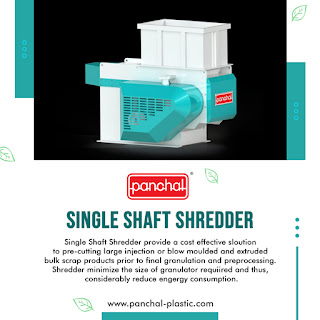Overview of the Plastic Products Manufacturers
Plastic is a large industry that includes many
players. We'll be looking at their names and the products or services they
offer. Most people focus on the "plastics products manufacturers"
when asked to describe the industry. Let's begin with these manufacturers.
We'll then go on to show you who works with them before the product is produced
and delivered to consumers.
There are two ways to describe what a manufacturer does: either by their process (the plastics they use) or by the industry they serve (packaging, automotive, etc.). The Granulator type of process to use depends on the final product. A manufacturer does not need to be familiar with all processes. Many manufacturers specialize in one or two processes. Although larger plants might have more than one process, it's rare to have all of them under one roof. This is because the process selection is dependent on the final product or industry the manufacturer is supplying. A company that supplies the electronics industry might have an injection molding process for making TV casings and other components. They are not interested in blow molding processes used for making bottles.
Different industries use plastics extensively. These
industries include medical and pharmaceutical, packaging; electronic and
electric; automotive; toys and building and construction; home goods;
agriculture and many others. Although most plastic manufacturers sell their
products and parts to other industries, some do trade within themselves. Eg.
For example, plastic bag manufacturers that specialize in producing bags will
sell them on to other plastics producers for packaging purposes.
There are many kinds of plastic materials. There are
many types of plastic materials. Each type has different grades that can be
used for different purposes and different processes. Eg. Polypropylene (PP) is
a popular material with many uses. Although they are often made from the same
materials as those used to make car bumpers, PP materials used for plastic bags
have different properties.
Resin producers are petrol-chemical plant that make
plastic resins. This is the raw material used to make plastics. They use
by-products of crude oil refineries to produce plastic materials. There are
many types of resins that different resin producers specialize in. They supply
large quantities of resin to both manufacturers (those that consume several
hundred tons per month) and to resellers.
Resin traders purchase raw material from resin
producers to sell to manufacturers in smaller quantities. A trader can often
represent multiple resin producers, providing manufacturers with a wide range
of materials.
Additives and Colorants Suppliers - Most materials are
translucent or transparent in their natural state. However, colorants can be
added to make them appear different colors. Chemical agents that alter the
properties of a material are called additives.
Compounders companies specialize in mixing large
quantities of additives, colorants and materials. These companies own large-scale
mixing machines that can mix several tons of material at once. Mixing compound
materials is more consistent than mixing them in small quantities with smaller
mixers.
Machine Suppliers supply machines to manufacturers
that make the product. Plastic products no longer need to be moulded manually.
These machines are the backbone of any manufacturing plant. Machine makers are
classified based on their specialization. These processes include Injection
Molding and Blow Molding.
Auxiliary Equipments suppliers provides various
machines and Equipments that will help a plant run smoothly. Hopper Dryers are
used to dry materials; Mixers are used for mixing materials; Robotics can
extract products from the machine; material handling systems and conveyor systems
are all examples of such machines.
Mold Fabricators- The molds are attached to the
machines that process plastics. Some molds are very complex depending on the
process. Mold makers are skilled in the use of precision tools to cut steel
blocks into the desired shapes. They provide the blueprints for the final
product using advanced CAD/CAM software’s (Computer Aided Design/Computer Aided
Machining).
Technical and Engineering Services- Some products need
to be certified according to specific standards depending on their intended
use. These companies offer such testing to car bumpers to make sure they are
strong enough to withstand impact.
Secondary Processing is a broad term. This term refers
to the extra work required after parts have been produced. Printing, painting,
polishing and trimming are all examples. While most manufacturers have some
secondary processes in place, specialists are often able to perform specialized
processes like chrome plating.



Comments
Post a Comment